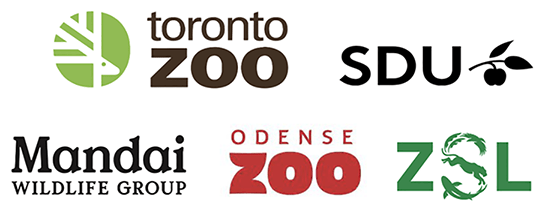Thank you!
We thank our sponsoring partners: Toronto Zoo, Mandai Wildlife Group, Odense Zoo, University of Southern Denmark, and the Zoological Society of London (ZSL). We could not achieve success without your partnership.

Over 50 years, the contributions of Species360 members have created the world’s largest database on animals under human care. We strive to make these data available to support all those who want to conserve species, improve animal care, and advance science. We also work to process and analyze these data to provide critical information to our members and the conservation community. If you would like to know more about our Species Knowledge Index, please visit this webpage.
As part of this vision, we support researchers and members around the globe by:
If you would like to learn more about Species360’s data privacy policy, please click here.
Species holdings data include the number of living individuals and their location at our member institutions. Requests for species holdings data needs to be submitted via a Research Request. *Please note: Publishing species holding at the institutional level violates Species360 terms and conditions. The institution information must be anonymized for publication.
Species360 hosts an Insights program so your institution can access a variety of data in ZIMS without submitting a Research Request. For more information, please see our Insights page.
In the document provided here, you will find all the information you need about the process to submit Research Requests.
You can complete a Research Request through this link. Any email communications should be directed to support@species360.org.
Please see our Open Data Portal below.
Download open data from our Conservation Science Alliance research publications:
A study published in Proceedings of the National Academy of Sciences standardizes demographic records across 22 databases for 97% of all tetrapod species, and demonstrates the impact of data from zoos and aquariums. Read the full journal article, learn more about the research, download the open data, and access feature news at Radio-Canada.
Looking collectively at 3,370 fish and coral species in 594 aquariums and zoos worldwide, findings of the paper “Assessing the conservation potential of fish and corals in aquarium collections globally,” are published in Journal for Nature Conservation (April 2019). Read the full journal article, learn more about the research, or download the open data.
A global database maps wrecks intentionally deployed to serve as artificial reefs, including 1,907 records from 88 sources. Read the journal article at ScienceDirect (April 2019), learn more about the research project, download the open data results, and read featured news coverage at BBC Future Now.
A manual commissioned by and developed for CITES Secretariat aids law enforcement agencies in identifying wild-caught vs captive-bred turtles and tortoises. Access the full manual at CITES, learn more about the Conservation Science Alliance CITES research or download the open data results.
Standardized data on biological information, conservation status, management opportunities, use, and inclusion in international conventions and treaties for all sharks and batoid species. Read the full article here, learn more about the research, or download the data.
Economics, Life History and International Trade Data for seven turtle species in Malaysia and Indonesian farms. Read the full article here, learn more about the research or download the open data.
A standardized dataset with data on conventions and treaties, human use, extinction risk, management opportunities, biological Information, and intrinsic values for conservation prioritization of the 6659 songbirds. Read the full article here, learn more about the research, or download the data.
We thank our sponsoring partners: Toronto Zoo, Mandai Wildlife Group, Odense Zoo, University of Southern Denmark, and the Zoological Society of London (ZSL). We could not achieve success without your partnership.
